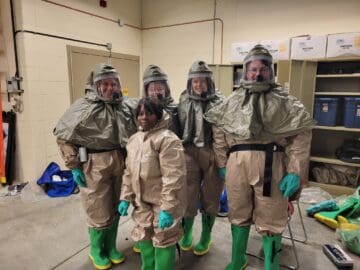September 8, 2022
Unlike knowledge or skills, which can be acquired quickly, growth of one’s character – defined as one’s mental and moral qualities – occurs slowly over time.
I’ve identified six stages that people move through over the course of their careers: Beginning, yuckiness, fear, authenticity, boundaries and love (the seventh stage, exit, occurs when people leave the work arena).
When you are in a leadership position, your behavior, decisions and actions are continually scrutinized by others as a reflection of your character.
Based on my experience, the ability to comprehend, master and successfully embody key leadership principles depends on your stage of character development.
In a nutshell, the more advanced your character, the more evolved and effective your leadership practices will be.
An example
Take Charles, an executive whose character development had been stalled in the “fear” stage for decades.
Trapped within the self-protection of the fear stage, Charles was incapable of moving his business unit forward to align with a strategic enterprise-wide transformation.
He was safe within the empire he had inherited from his predecessor and then fortified for his comfort.
That meant, he was threatened by changes to his heretofore successful business unit.
As I see it, this is not a leadership issue; it’s a matter of character.
It’s unrealistic (not to mention frustrating, and sometimes, costly) to expect a leader who is in the fear stage of character development to successfully implement and sustain leadership practices that require objective reasoning, adaptability and/or raw courage.
With character established as the issue, it makes sense that repeatedly studying change leadership had been fruitless for Charles.
Likewise, attempting to inspire others to change from a place of fear and ego had proven ineffective for Charles.
Neither approach addressed the real issue: This executive’s mental qualities of reasoning, resilience, decision making and his moral qualities of courage, fortitude, loyalty and so on, were limited by his stage of character development.
The answer for Charles – and for you – is to identify your stage of character development at work, and then become intentional about developing your character.
Doing so will increase the leadership principles and techniques that you can successfully employ to lead people.
Getting started
First, it helps to understand the sequence of the stages and then learn to recognize the common, observable leadership tendencies of each stage.
That way, you can evaluate your current stage and your progress.
By way of a quick overview:
Leaders in the beginning stage of character development often lack the ability to articulate the mission of the company or the purpose of the work, leaving employees adrift and confused.Leaders in the yuckiness stage may thoughtlessly point out the inappropriate or unhelpful behaviors of employees without offering consequences or solutions for improvement.Leaders in the fear stage may be reactive or they may be unable to take action without getting permission.
They may spend much more time blaming than acting to resolve relevant issues.
Some leaders in the fear stage have been known to create toxic work environments where disengagement or burnout becomes prevalent.
Leaders in the authenticity stage are empowered and able to encourage others to exercise their voices and offer opinions. Leaders who operate from this stage often focus on and invest in their own development and that of others.Leaders in the boundaries stage may be thoughtful about implementing strategies and structure in an effort to prevent confusion and conflict. They are usually adept at making effective and timely decisions based on the mission, vision and values of the organization. They are skilled at teaching team members about their roles and the roles of others.Leaders in the love stage tend to view their leadership roles as opportunities to serve others. They serve by identifying worthwhile work, removing obstacles to effective work and developing others. Far and away, leaders who lead from the love stage create more high-performing teams, better relationships and more robust cultures than leaders who operate from any other stage.
The lessons of each stage build on each other and have a cumulative developmental effect. Over time, the mental and moral qualities you choose to develop will gain strength, clarity and impact.
You will move forward through the stages, increasing your capacity for leadership maturation.
Quite simply, the more advanced your stage of character development, the greater access you have to more enlightened and consequential leadership practices.
Terri Jacke is the founder and President of Inspired Training Institute, Inc., an executive coaching and organizational development firm, and author of Is This a Lousy Job or Is It Me?: A Real-Life Guide for Achieving Success at Work.
 Ashwaubenon Bowling Alley installs Neoverse LED video wall
Ashwaubenon Bowling Alley installs Neoverse LED video wall Built on safety, powered by people
Built on safety, powered by people








